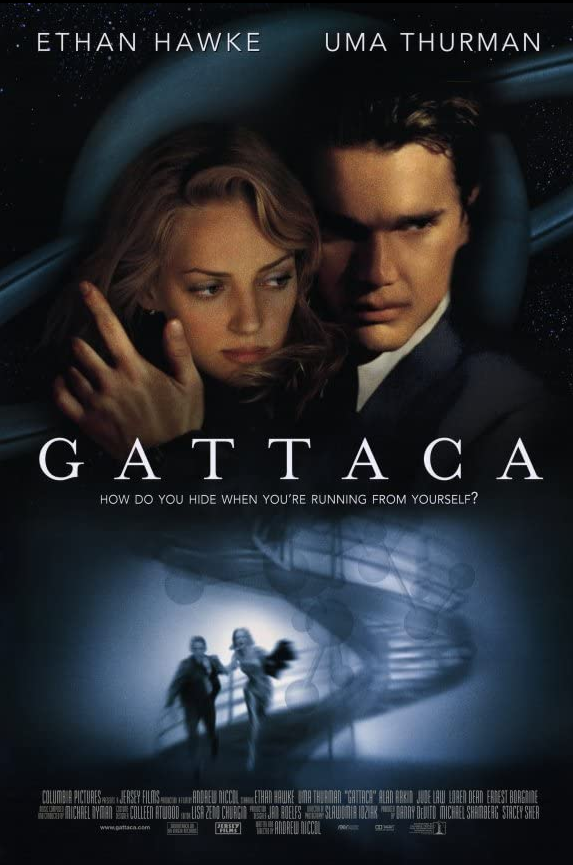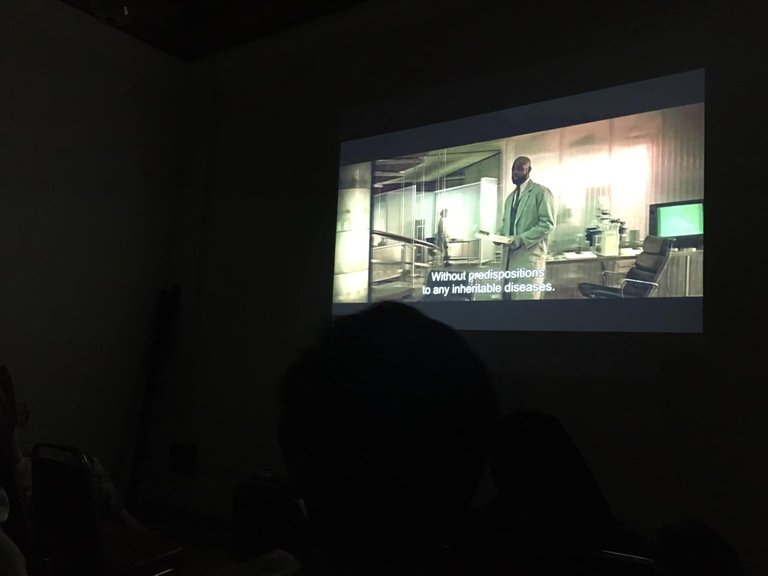NOOB FILM REVIEW - THE PHILOSOPHY BEHIND GATTACA (1997) directed by Andrew Niccol

(This review was written during the Kuala Lumpur's Philosophy Fest last week. In one session, there was a screening of the film Gattaca and the invited panels were a film director, Al Jafree and a scholar, Dr. Azman Ismail. Here are my thoughts after the session, and after watching the film again after more than 20 years)
What is immediately clear to me (philosophically) is that this film is of Retrofuturism, which is defined as, "how predictions of the future were depicted in an earlier era. It's a combination of modern-day aesthetics, futuristic technology, and old-fashioned design."
I am with one of the panel, a film director, Al Jafree when he said this is a telling of a dystopia. While Dr. Azman Ismail touches on the social setup of being industrial and hypermodern in need of a 'new myth'.
It is quite the same thing that Joseph Campbell said about Star Wars being the new myth needed to feed on the expansion of the modern human mind and imagination. It started ever since mankind got out of the cave and the dense forest. They eventually discovered the horizon, looked up to the sky, and wonder. The myths of heavenly abodes were eventually born.
But regardless of the setup, Star Wars, at its root talks about a protagonist Luke Skywalker in a quest for knowing who he really is. A self-discovery. And in Gattaca, it is about Vincent Freeman (Ethan Hawke. his last name is a strong hint) in a quest to be free to achieve his ambition, which is going to space. Both protagonists, in a way, like Al Jafree has also mentioned, are on their own 'Hero's Journey'.
Also brought forward by one of the attendees, Rozan Mat Rasip was the symbolism of the scenes involving the ocean where in one scene Vincent Freeman was naked. Apart from Al Jafree's take of it being spiritual, to me, particularly along the film's narrative, is of its cleansing properties (hence Vincent being naked). The ocean (or mother earth) shows that in both swimming contests, Vincent is the stronger one compared to the so-called 'genetically perfect' brother. Yes. It is also subliminally about brothers' rivalry. Hence why there is the crime thriller where his brother is the investigator subplot to make Vincent who he is in the end.

But what interested me the most is the character Jerome Eugene (Jude Law. Also note the last name) who despite being genetically perfect and the best man for the space mission, sees no meaning to it all and decided to help Vincent to go instead of him. After accomplishing that, he cremated himself. That is a strong Albert Camus Absurdism statement where the "contradiction between humanity's desire to find meaning in the Universe, and the Universe itself which is completely meaningless." And both the character Vincent and Jerome has been juxtaposed just to show that. Vincent instead goes to the other extreme end of Absurdism (Nihilism?), which is to find meaning, which is what he said at the end.
"For someone who was never meant for this world, I must confess I'm suddenly having a hard time leaving it. Of course, they say every atom in our bodies was once part of a star. Maybe I'm not leaving... maybe I'm going home."
This instantly reminded me of what Neil deGrasse Tyson said in his Cosmos series "Human is the Universe looking back at itself" because we are made of it. Apart from the title Gattaca is actually the genetic code (which is comprised of the letters G,A,T and C. Also the many uses of the spiral staircase which is the shape of the DNA), it is like Al Jafree said has been used in this dystopian tale of genetic engineering to divide the human into classes.
It is ultimately about humans trying to play god and quoting the verse from the Koran which says "God created us differently for us to know each other." And what will we discover when we finally know each other? That we are all the same.
And the never-ending discussion about the finality of fate which is determined by the divine and the free will of man in choosing his own path. Would Vincent ever get to the mission to outer space if he just accepted his fate as an 'in-valid' cleaner? Or is it his free will that paved his way toward his goal and the master of his own destiny?
Also note the test doctor wearing white before Vincent gets into the rocket, acting like an angel approving his heavenly ascension. There are many rocket launches seen from the beginning of the film. Is it a symbol of enlightenment for those who are worthy? The camera pans from one face to another inside the rocket and stopped at Vincent's. Maybe the rest of them are 'in-valid's too with their own story on getting there.
The most powerful motivation is indeed rejection. Maybe that is why the Chinese in this country (Malaysia) still end up being in front despite the Malays being given the advantage since the New Economic Policy (NEP) in 1970. One does need to be philosophical in explaining that.
This session is more of a philosophy in the film. What it could have been being a session about film philosophy.
Thank you for making all the way to the end :)
It's one of my favorite films, they deal with genetics and ethics very well. It has tension and emotion. It's good to see this movie here, maybe it will inspire others to watch it.
Yes...indeed. Great movies stand the test of time. Thanks for dropping by!